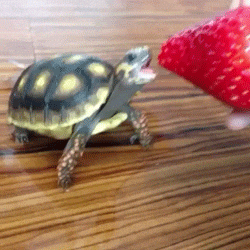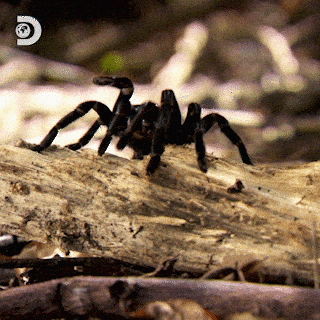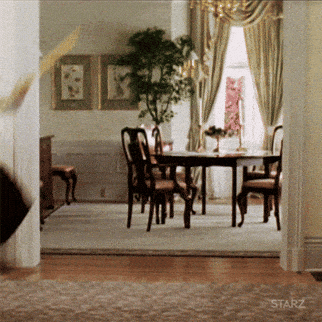- The Ideas Factory
- Posts
- Why alerts are a journalist's best friend... plus the most perfect pitch
Why alerts are a journalist's best friend... plus the most perfect pitch
Hello!
I am having the most enjoyable day reviewing an upcoming popular science book. While reviews aren’t the most lucrative gig for a freelance writer - given it takes at least 10 hours to quickly read an average length non-fiction, plus at best half a day for writing the actual review - I occasionally take these assignments on because the books themselves often generate ideas for future stories. Whenever I come across an interesting study mentioned within it, I make a point to contact the lead researcher. Books take so long to write that researchers often have new results by the time the book hits the shelves.
This week, I’ll be demonstrating the value of alerts for generating ideas, highlighting a few upcoming events to add to your calendar, and sharing one of the best pitches I’ve ever received…
ALERT, ALERT, ALERT!
Whenever I’m feeling particularly uninspired or the ideas cupboard is looking a little bare, I spend a few happy hours scrolling through my alerts.

Gif by disneypixar on Giphy
Writing primarily about health, I get most of my alerts from The National Library of Medicine. Over the years I have amassed thousands of them. They range from keywords that are particularly interesting to me - such as aphantasia, hyperthymesia or endometriosis, to the names of researchers whose work I’m interested in, Adrian Owen or Barbara Sahakian, for instance. I also have alerts for when my favourite journals are published and over the years I’ve added phrases like ‘first-in-man’ to stay on top of cutting edge developments.
As a trial, I just spent 10 minutes looking through the most recent alerts in my inbox to see if they generated any ideas. Here’s what happened:
Unveiling the epigenetic impact of vegan vs. omnivorous diets on aging: insights from the Twins Nutrition Study
Here’s a lesson in reading past a long-winded title… this is actually a fascinating paper showing how an 8-week vegan diet caused significant decreases in “epigenetic age acceleration” compared with an 8-week meat-based diet. Epigenetic ageing is a really well established marker of health and I think this is a study that’s worth a short news story. I also hadn’t ever come across the Twin Nutrition Study before and now have an alert for that, too.
This trial of poo transplants for treating Parkinson’s jumped out to me because it shows no difference in improvements between those who received a transplant and those who received a placebo. The media (and journals) are biased in under-reporting negative results like this, so I think it’s important to try our best to convince publications to write about results when they show promising treatments might not work. You can always add extra value by sending this to the main proponents of fecal transplants to find out how this impacts the field. If it does, then what’s the next new treatment that might take its place?
Erm… yeah I didn’t understand that either! This one didn’t have enough relevance to the everyday reader to make a stand-alone story, but it did make me think ‘wow, some people really care about strawberries’, which led me to wonder where there’s a piece to develop for a gardening magazine about ‘How to grow the perfect strawberry - according to science’ with all sorts of nerdy advice on colour, nectar, conductivity and how to apply it to your own crop. Probably one to work on for next spring.

Giphy
Of course, you can create alerts for any other beat, too. Google Scholar is great for new research and Google alerts can be toggled for specific news, trends or topics that you’re interested in. I also use these to monitor my name to see who’s talking about / republishing stories I’ve written, and to make sure I don’t miss any journalism awards deadlines, too.
SPEAK TO:
Anyone with an interest in spiders or any other creepy animal. Hear me out. Science magazines, BBC Future, even national newspapers love a seasonal story, and in magazine world we’re fast approaching halloween. Lead times differ for different publications but it’s great to offer a fantastically spooky story in good time for All Hallows’ Eve.
Maybe it’s worth giving a call to someone like Eileen Hebets, who has previously published papers on why post-sex cannabalism aids spider offspring and on the scary spider from The Goblet Of Fire.
Halloween-based stories don’t just have to be weird and wonderful, they can have serious messages too. How about talking to Luis Escobar, whose team is studying vampire bats to help understand how and why cross-species virus transfer occurs to help prevent the next pandemic
Also, in writing this post I fell down a rabbit hole after coming across the fascinating Journal of Arachnology, which I shall now be adding to my alerts (see above).

Gif by discoveryeurope on Giphy
GO TO:
THE SOCIETY FOR NEUROSCIENCE 2024 Im biased, of course, given my degree in Neuroscience, but this is my favourite meeting of the year. For anyone near Chicago in November this is well worth the trip. You’ll need comfortable shoes to get round all of the poster presentations and you’ll find it impossible to attend all of the talks you want to go to, but what you do see and hear will keep you in ideas for months. I always used to travel to this meeting in my first few years as a reporter. Now with kids it’s a little harder to get to, but I’ll always make sure I keep a few days clear to browse through abstracts and listen in on any talks that are broadcast virtually.
5-9 October 2024, Chicago.
UK HYPNOSIS CONVENTION 2024 Now, there’s a possibility that you’ll have to wade through some not-so-scientific talks at this event, but I also think there could be some nuggets here too. I’m endlessly fascinated by hypnosis from a scientific mind-body point of view, and think this conference might offer up a few new insights that could generate a bunch of story ideas. Sometimes, you can even pitch an idea based on just being at a conference, as Jessica Hamzelou did an amazing job of recently for Tech Review:
15-17 November 2024, London
USE:
TikTok. Hate it or love it - trust me, when it comes to thinking of ideas TikTok can spark one when you least expect it. Just last night, I was mindlessly scrolling through videos when I stumbled upon someone discussing maternal gatekeeping. This concept involves women taking excessive control over parenting and household tasks, which can lead to their male partners doing less, and ultimately, women bearing the brunt of the mental and physical workload.
I checked and there are studies that have looked into this behaviour and the resulting outcomes on relationships. Naturally, there’s a lot of people who believe that this idea is unfair to women, and just removes the blame off lazy men… it’s got all the makings of an interesting topic to deep dive into, with a bunch of explosive opinions and a relevance to a huge section of the population. If I had time I’d love to look into the real behavioural science behind it all and figure out if there are any solutions to the problem. Alas, I just don’t have the capacity right now, but it’s an excellent example of where late-night scrolling can sometimes pay dividends.

Gif by starz on Giphy
PITCH CALL-OUT OF THE WEEK:
Highlighting this pitch call-out from Emily Krivograd of the Insider this week, who is looking for beauty stories. It’s not the best paid publication, but flagging because she says she’s willing to take a chance on a first-time writer. Could be a good foot in the door.
Looking for beauty pitches! If you've been waiting to write about the one product you've used for 10+ years, dish about your favorite dupes, or confess a beauty regret, fill out this form. No writing experience necessary. Rates start at $225 for 600 words!
— Emily Krivograd (@Emily_Krivograd)
6:53 PM • Aug 14, 2024
Last but not least, I promised to show you one of my favourite pitches, which I received while working at New Scientist. It was crafted by the most wonderful journalist and author David Robson, who has given me permission to show you all.
I’m going to write about how to craft the perfect pitch in an upcoming newsletter so for now, I’m going to leave this here, un-annotated. Give it a read and try to work out why it got an immediate commission. I’ll chat more about it next week, and show you the story it generated, plus I’ll be demonstrating why talking to your friends can be the easiest way to generate a sellable idea.
Happy pitching everyone! x
“Our understanding of depression is at a crossroads. Since the 1960s, the “serotonin hypothesis” has been the leading explanation of the disorder. It made sense – the neurotransmitter is thought to be involved in regulating our mood, and most of the antidepressant drugs that we use were thought to raise the levels of serotonin washing around the brain. Dissent has been growing for some time, however, and in late July, a bombshell paper – analysing data from 17 systematic reviews and studies – concluded that there is no good evidence that impaired serotonin signalling results in depression.
Whether serotonin is completely irrelevant for the disorder, or whether it might still be important for a small number of cases, remains a matter of debate – but it now seems certain that low levels of the neurotransmitter, alone, cannot be the primary cause. So what else might explain patients’ symptoms?
Over the past few years, psychiatrists have identified several other potential pathways, including the ideas that depression is caused by brain inflammation, oxidative stress, mitochondrial dysfunction in neurons, and reduced neuroplasticity and neurogenesis. Potential cognitive mechanisms include the proposals that depression results from negative processing biases – resulting from impaired executive function – and problems with mental time travel that results in feelings of helplessness and impaired problem solving. Many of these pathways will be interlinked to a certain degree, but the precise interplay may differ from person to person – which would explain why the experiences of depression can be so varied among patients.
SSRIs, the most common form of antidepressants, may already work on these pathways, which could explain why they are effective in some patients, even if serotonin itself is not involved in depression. But with this new understanding, it will also be possible to find more targeted drugs and cognitive therapies. These new theories of depression might also help to explain how lifestyle factors, such as diet, influence the risk developing the disorder – and might result in better guidelines for preventative medicine.
This piece will examine the state-of-the-art in depression research and the ways this new understanding will benefit patients.”
Who is Helen Thomson?
I don’t like to blow my own trumpet but I’m an award-winning journalist with almost 20 years experience. I started my career in entertainment reporting, despite having a BSc in Neuroscience and an MSc in Science Communication. I soon became one of the family at New Scientist magazine, working on the news desk as a reporter and editor before stepping into the freelance world to write my first book. “Unthinkable: An Extraordinary Journey Through The World’s Strangest Brains” was a Times Book Of The Year in 2018, and an Amazon Best Seller.
My favourite endorsement was from Ed Yong, who said “in beautiful prose, she seamlessly dances between conversations with nine extraordinary people and beautiful explanations of how the brain works… remarkable.” Thanks Ed!
While I was freelancing I also wrote for many organisations, including the BBC, The Guardian, The Observer, The New York Times, The Daily Mail, Forbes, Nature, Psychologies and more.
After seven years freelancing I returned to New Scientist as Head of Features, commissioning long-form writing, and now I’m once again back in the freelance world.You can find out more about me here or if you’re feeling generous buy one of my books here.
Outside of work I live in South East London with my two wonderful kids and husband, and will always say yes to a. wine, b. wild swimming and c. a Bonjovi concert.

